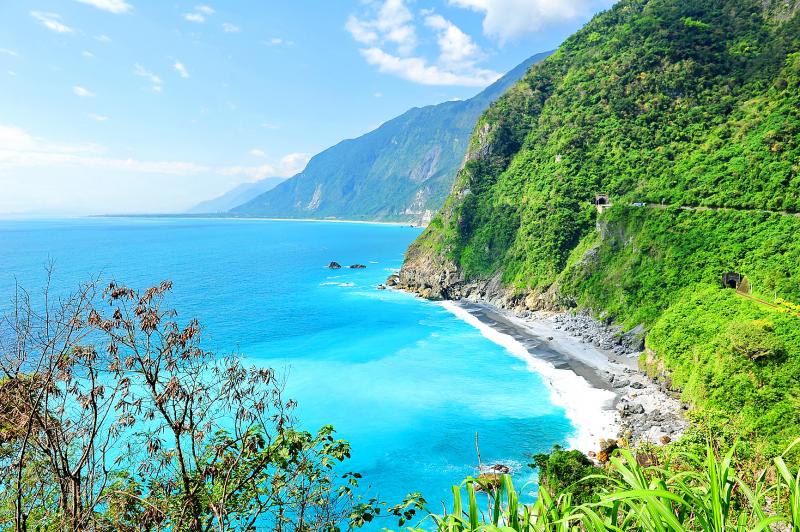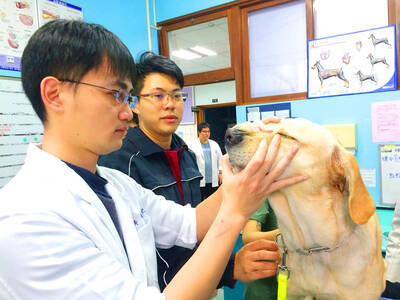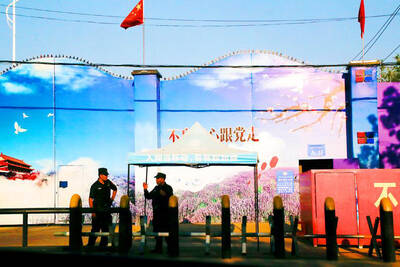Tourism officials and companies are anticipating booming domestic business over the Lunar New Year holiday due to travel restrictions implemented because of the COVID-19 pandemic.
This year’s Lunar New Year holiday begins on Feb. 11.
Tourism agencies have reported an 80 percent room reservation rate between Feb. 10 and Feb. 16 in tourism hotspots, while reservation rates at five-star hotels in Hualien and Taitung area have exceeded 90 percent.

Photo courtesy of Cola Tour Co
Changhua County is the most popular location for Lunar New Year visits, with the Hualien and Taitung area second, Tainan in third, Yilan and Nantou counties in fourth and fifth, and Kaohsiung in sixth place, the officials said.
Changhua County claimed the top spot, as central Taiwan is host to many temples where the main deity corresponds to a profession, Lion Travel Co said.
The deity at Wenchang Temple (文昌宮) is the divine protector of academics and education; the deity at Zihnan Temple (紫南宮) in Nantou County and the deity at Yunlin County’s Wude Temple (武德宮) oversee financial fortune; while the deity at Changhua County’s Lugang Tianhou Temple (鹿港天后宮) oversees prosperity of businesses, the company said.
The Hualien and Taitung area claimed second place due to its plethora of hot springs and beautiful landscapes, the travel company added.
Lion Travel is selling dynamic package deals that allow people to customize their travel plans, as this is more popular with the smaller tour groups required due to the pandemic.
Cola Tour Co said that it is targeting family groups with packages that allow a child aged under 12 to travel for free if they are accompanied by both parents.
It is also selling three-day, two-night packages for five people, with the fifth person traveling for free.
The company said that it is providing packages and services for visits to Taipei, Tainan and Hualien, as well as the nation’s outlying islands.

Former Czech Republic-based Taiwanese researcher Cheng Yu-chin (鄭宇欽) has been sentenced to seven years in prison on espionage-related charges, China’s Ministry of State Security announced yesterday. China said Cheng was a spy for Taiwan who “masqueraded as a professor” and that he was previously an assistant to former Cabinet secretary-general Cho Jung-tai (卓榮泰). President-elect William Lai (賴清德) on Wednesday last week announced Cho would be his premier when Lai is inaugurated next month. Today is China’s “National Security Education Day.” The Chinese ministry yesterday released a video online showing arrests over the past 10 years of people alleged to be

THE HAWAII FACTOR: While a 1965 opinion said an attack on Hawaii would not trigger Article 5, the text of the treaty suggests the state is covered, the report says NATO could be drawn into a conflict in the Taiwan Strait if Chinese forces attacked the US mainland or Hawaii, a NATO Defense College report published on Monday says. The report, written by James Lee, an assistant research fellow at Academia Sinica’s Institute of European and American Studies, states that under certain conditions a Taiwan contingency could trigger Article 5 of NATO, under which an attack against any member of the alliance is considered an attack against all members, necessitating a response. Article 6 of the North Atlantic Treaty specifies that an armed attack in the territory of any member in Europe,

LIKE FAMILY: People now treat dogs and cats as family members. They receive the same medical treatments and tests as humans do, a veterinary association official said The number of pet dogs and cats in Taiwan has officially outnumbered the number of human newborns last year, data from the Ministry of Agriculture’s pet registration information system showed. As of last year, Taiwan had 94,544 registered pet dogs and 137,652 pet cats, the data showed. By contrast, 135,571 babies were born last year. Demand for medical care for pet animals has also risen. As of Feb. 29, there were 5,773 veterinarians in Taiwan, 3,993 of whom were for pet animals, statistics from the Animal and Plant Health Inspection Agency showed. In 2022, the nation had 3,077 pediatricians. As of last

XINJIANG: Officials are conducting a report into amending an existing law or to enact a special law to prohibit goods using forced labor Taiwan is mulling an amendment prohibiting the importation of goods using forced labor, similar to the Uyghur Forced Labor Prevention Act (UFLPA) passed by the US Congress in 2021 that imposed limits on goods produced using forced labor in China’s Xinjiang region. A government official who wished to remain anonymous said yesterday that as the US customs law explicitly prohibits the importation of goods made using forced labor, in 2021 it passed the specialized UFLPA to limit the importation of cotton and other goods from China’s Xinjiang Uyghur region. Taiwan does not have the legal basis to prohibit the importation of goods